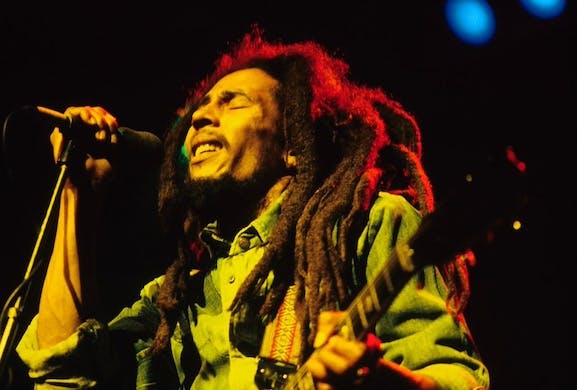New Film Touches on Bob Marley’s Greatness, but Like His Career It Could’ve Been Much More
Marley’s story could have easily been the subject of an epic. Instead, ‘Bob Marley: One Love’ brings to mind a description of the recent Priscilla Presley biopic, ‘a minimalist biography.’

All through “Bob Marley: One Love,” I kept wondering what a more ambitious movie of the legendary musician’s life would be like, along the lines of “Gandhi” (1982), “Malcolm X” (1992), and “Milk” (2008). Although foremostly a singer, songwriter, and bandleader, Bob Marley (1945-81) was also a champion of social justice and a key figure in multiple civil rights movements — and all four were also targets of assassinations, though Marley is the only one who survived being shot.
Marley’s story could have easily been the subject of an epic, like the three historical dramas cited above. Instead, “Bob Marley: One Love” brings to mind how Leonard Maltin described the recent biopic of Priscilla Presley, “a minimalist biography.” Rather than a three-hour spectacular like the biopics that tell the whole story from cradle to grave, director Reinaldo Marcus Green has chosen to concentrate on one specific chapter in Marley’s life.
Mr. Green and writers Terence Winter, Frank E. Flowers, and Zach Baylin (Mr. Green is also co-credited in the screenplay) start the drama in 1976. This was a moment when the Cold War turned dangerously hot in Jamaica, and opposing political parties allied with the East and West were turning the newly independent island nation into a powder keg that exploded more than once.
Marley, played by Kingsley Ben-Adir — who, coincidentally played Malcolm X in “One Night In Miami” — is preparing for a concert that he hopes will ease tensions between the two sides when two gunmen sneak into his house and open fire on him, his manager, Don Taylor (Anthony Welsh), and his estranged wife Rita (Lashana Lynch).
Marley not only survives, but he goes on to play the concert. Nonetheless, he relocates to London for more than a year. The bulk of the film concentrates on that period, flashbacking to key incidents in his earlier life and career, giving us scenes of his almost nonexistent relationship with his father, Norval Marley, who was British, white, and, in some accounts, an officer in the Royal Marines. He died when Marley was 10. There are also scenes from his early career, his first recording with the original Wailers, including Peter Tosh and Bunny Wailer, and a sensitive depiction of his conversion to Rastafari.
While in London, Marley records his most successful album yet, “Exodus” — James Norton does an excellent job playing Chris Blackwell, the producer who brought Marley’s music to the larger world, and Michael Gandolfini has a memorable cameo as a short-sighted record executive. We end with Marley’s return to Jamaica in early 1979, and his bringing together the leaders of the two warring factions in a triumphant concert.
The joy of the scene is poignantly undercut with a flash-forward to Marley’s death from cancer two years later.
Mr. Ben-Adir captures Marley’s essence as well as any actor could, though he’s considerably taller and more conventionally good-looking in a movie-star kind of way; it’s a bit like watching Gary Grant play Cole Porter in “Night and Day” (1946). The script portrays Marley as a highly spiritual man, who was genuinely concerned with the welfare of his fellow human beings, but far from a saint.
He gets testy with Rita at one point when she’s taking care not only of their children (including his oldest, Ziggy Marley, the contemporary reggae star who is also one of the film’s producers) but his children with other women (he had 11 altogether), and he physically attacks his manager — the same one who took six bullets for him — when he suspects Taylor of skimming some of his proceeds.
The filmmakers give us just enough of each area of Marley’s life, including his creativity process — we see how “Exodus” was inspired by Ernest Gold’s 1960 movie theme of that title — and his extraordinary philanthropy. According to formal biographies, like the excellent “Bob Marley: The Untold Story” by Chris Salewicz, and documentaries, Marley used his millions from record sales and touring to support thousands of needy individuals in Kingston.
At a terse 107 minutes, we get a taste of every aspect of Marley’s legacy, especially his music — which is only melodic and rhythmic and lyrical, but charged with positive energy, social justice issues, history, theology — and his tireless work as a force for peace. As he sings in “War,” “Until the color of a man’s skin / Is of no more significance than the color of his eyes / Me say war.”
The most valuable aspect of “Bob Marley: One Love,” is that it gives us another excuse to talk about Marley — not that we ever need one to listen to his music. On the eve of what would have been his 80th birthday, that music is still bringing the world together.

